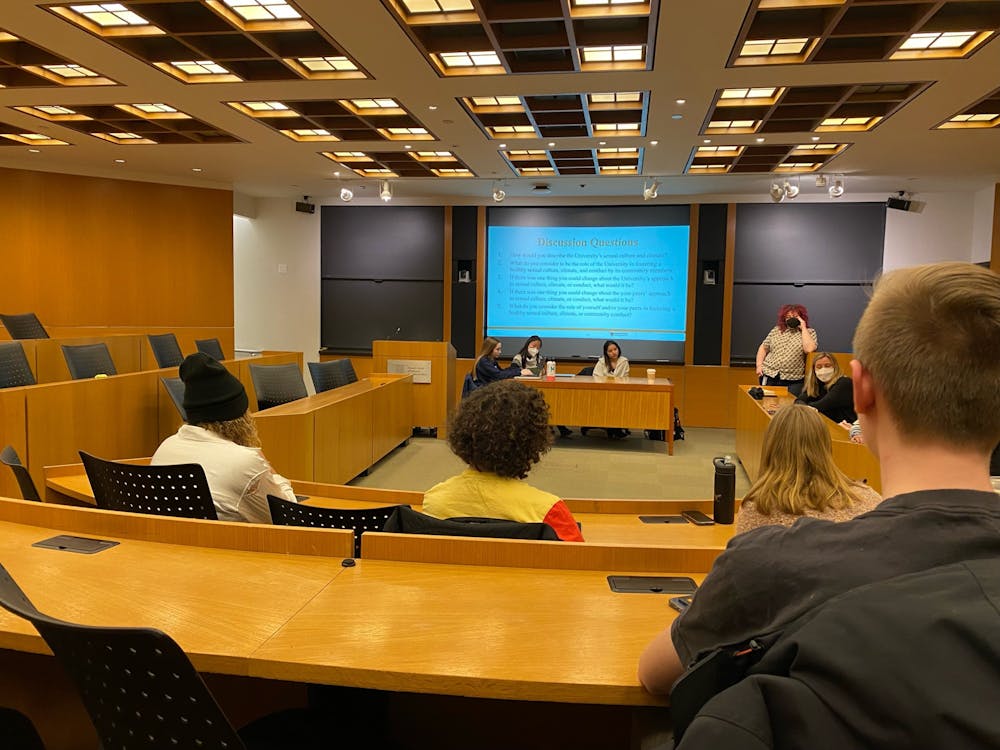The Undergraduate Student Government (USG) discussed the University’s sexual culture and issues around sexual misconduct in a conversation with members of the Council of the Princeton University Community (CPUC) at their weekly meeting on Sunday, April 3.
The USG Senate also approved eight new student groups and a budget proposal from the Mental Health Initiative (MHI), and heard updates on mental health related recommendations previously proposed by USG members.
Members of the CPUC Ad Hoc Committee on Sexual Climate, Culture, and Conduct presented their research to the USG. The Committee was established in December 2019 to bring together faculty and students to address sexual climate and misconduct on campus. At the USG meeting, present committee members included Vice President for Campus Life Rochelle Calhoun, Committee Director of Gender Equity and Title IX Administration Regan Crotty, Sexual Harrasment/Assault Advising, Resources and Education (SHARE) Director Jacqueline Deitch-Stackhouse, and Director of Health Promotion and Prevention Services Sonya Satinsky.
“I’ll just tell you that the general goal of our committee and our work is to think about how we, as a University, look at particularly climate and culture, and improve it in such a way that everyone has an opportunity to thrive on our campus,” Calhoun said.
Calhoun explained that the Committee has used the book “Sexual Citizens” by Jennifer Hirsch ’88 and Shamus Khan as a foundation for its work. Hirsch has previously spoken on campus about her research.
Calhoun added that the committee has facilitated conversations around the sexual climate on campus with student leaders, directors of identity centers, faculty, and administrators to identify and respond to the issues that exist.
“From a SHARE perspective, we think that we have some work to do in developing a better culture and climate on campus,” Deitch-Stackhouse explained. “We need a culture around consent, we need a culture around respect, we need a culture around accountability, and we need a culture around bystander intervention.”
The committee members then opened the conversation to input from the USG, asking members to describe their perspectives on the University’s sexual culture and climate and offer recommendations for improving it.

MHI Representative Noah Luch ’24 raised concerns about the accessibility of resources surrounding sexual misconduct.
“What I’ve heard from a lot of students is it feels like the University increases the number of steps when really it should be decreasing the amount,” Luch said. “I guess my recommendation is lowering the barrier to entry — having an active role in seeking out people and saying, ‘Hey, if you want to talk about anything, here’s a coffee session where you can talk to us about your own experiences.’ Something like that where you’re actively going into the community rather than waiting for people to come to you.”
U-Councilor Carlisle Imperial ’25 described the underlying “hookup culture” on campus while Campus and Community Affairs Committee (CCA) Chair Isabella Shutt ’24 recommended that the administration work specifically with eating club leaders and members to ensure that students feel safe in the clubs’ party spaces.
Chief of Staff Dillion Gallagher ’23 added that “[t]here’s sometimes a concern among students that the students who care more about this issue are the ones responding to surveys, going to events, doing these trainings and taking them seriously, while other people are taking a more passive role, if they’re taking any role at all.”

“How can we make sure that this is reaching everybody and that it’s not a question of opting out?” Gallagher said.
Deitch-Stackhouse concluded this segment of the meeting responding to Gallagher’s question by informing USG that SHARE is working on a mandatory four-year curriculum designed to ensure that all members of the University community participate in these types of trainings and conversations.
After these remarks, the Senate transitioned to voting matters. Student Groups Recognition Committee (SGRC) Chair Derek Nam ’23 reported that the SGRC had approved eight new clubs and the Senate voted unanimously for their approval. Additionally, Luch presented a budget request on behalf of MHI of $2000 to host a lunch bringing together members of the administration, faculty, and student leaders to discuss experiences with mental health on campus. This proposal also passed unanimously.
At the end of the meeting, President Mayu Takeuchi ’23 checked in with Senate members, emphasizing her “holistic approach” to addressing mental health on campus and following up on a discussion held during the Feb. 20 Senate meeting that called on members to identify actions each could take to support mental health.
Luch reported progress with plans to set up a “wellness space” in Campus Club over the summer, and 2025 Senator Walker Penfield ’25 hoped to finalize a video guide for incoming first-years to accessing mental health resources by the end of the semester.
The meeting concluded with various members of the Senate encouraging their fellow students on USG to take care of their own mental health.
USG Senate meetings are held in Robertson Hall Room 016 at 8 p.m. on Sunday evenings and are open to all.
Alison Araten is a news staff writer for the ‘Prince.’ She can be reached at aaraten@princeton.edu and @alisonaraten on Instagram.








